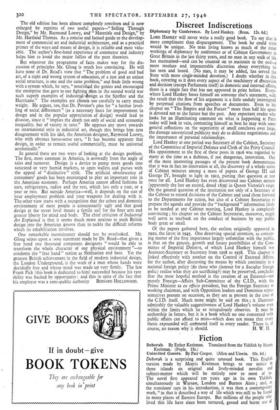Discreet Indiscretions
Diplomacy by Conference. By Lord Hankey. (Berm. 12s. 6d.)
Loan HANIC,EY will never write a really good book. To say that is more compliment than disparagement. The book he could write would be unique. No man living knows as much of the inner workings of diplomacy by conference or of Cabinet Government in Great Britain in the last thirty years, and no man in any walk of life has maintained—and can be Counted on to ,maintain to the end--a more resolute and impenetrable discretion about everything he has seen and heard. (No man, it may be added, has served the State with more single-minded devotion.) I doubt whether in this book, covering as it does every aspect of the machinery of discussion and decision (except Parliament itself) in domestic and external affairs, there is a single fact that has not appeared in print before. Every- where Lord Hankey bases himself on someone else's statement, with the result that the flow of his argument is a little unduly interrupted by perpetual citations from speeches or documents. Even in his chapter on " The Empire and the Future more than half his space is devoted not to the future but the past. Any expectant reader who looks for an illuminating comment on what is happening at Paris today will look in vain, contenting himself as best he may with some general reflections on the superiority of small conclaves over large, the damage unrestricted publicity may do to delicate negotiations and the importance of personal relationships.
Lord Hankey at one period was Secretary of the Cabinet, Secretary of the Committee of Imperial Defence and Clerk of the Privy Council. His appointment to the first of these posts in 1916 was regarded by many at the time as a dubious, if not dangerous, innovation. One of the most interesting passages of the present iaook demonstrates that it was in fact no innovation at all, the discovery of a whole series of Cabinet minutes among a mass of papers of George III and George IV, brought to light in 1912, putting that question at rest once for all. Lord Hankey has even discovered one Cabinet minute (apparently the last on record, dated 1839) in Queen Victoria's reign. On the general question of the institution not only of a Secretary of the Cabinet to record decisions of the Cabinet and send them forward to the Departments for action, but also of a Cabinet Secretariat to prepare the agenda and provide the " background " information likely to be needed at any Cabinet meeting, Lord Hankey is completely convincing ; his chapter on the Cabinet Secretariat, moreover, might well serve as textbook on the conduct of business by any public body great or small.
Of the papers gathered here, the earliest originally appeared in 1920, the latest in 1945. One deserving special attention, as contain- ing matter of the first importance largely unfamiliar with the public, is that on the genesis, growth and future possibilities of the Com- mittee of Imperial Defence, of which Lord Hankey himself was Assistant-Secretary or Secretary from 19o8 to 1938. This chapter :s linked effectively with another on the Control of External Affairs, for the author, after discussing the means by which continuity in a national foreign policy (do those who clamour for a Socialist foreign policy realise what they are sacrificing?) may be preserved, concludes that the most hopeful method is the creation of an External—not merely Foreign—Affairs Sub-Committee of the C.I.D., with the Prime Minister as ex officio president, but the Foreign Secretary as working chairman, and with Opposition leaders and Dominion repre- sentatives present on occasion, as they are at present in the case of the C.I.D. itself. Much more might be said on this ; it illustrates admirably the valuable suggestiveness of Lord Hankey's volume even within the limits which he so scrupulously observes. It may be authorship in fetters. but it is a book which no one concerned with public affairs can afford to miss—which does not mean that every thesis expounded will commend itself to every reader. There is, of
course, no reason why it should. H. W. H.


























 Previous page
Previous page